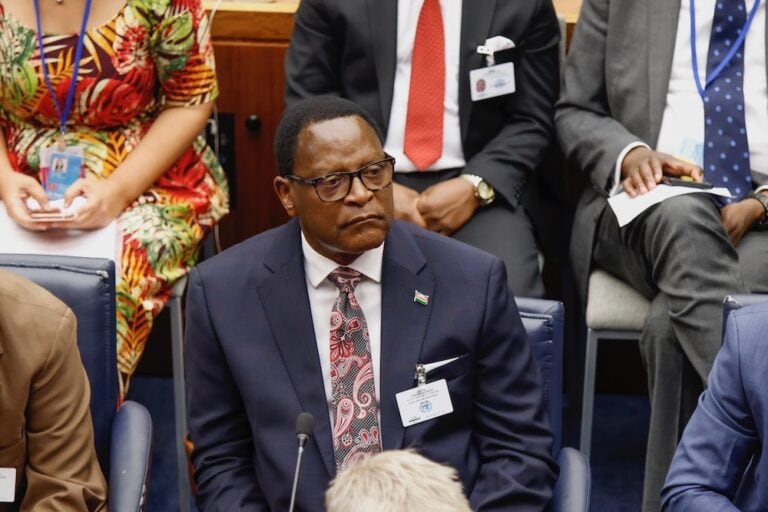Malawi President Bakili Muluzi and wife, Anne, have each sued two privately-owned newspapers for defamation. Deputy Registrar of the High and Supreme Courts, Winter Qoto, stated that President Muluzi has sued “The Tribute”, a weekly newspaper, for alleging that the President had fraudulently acquired land worth half a million Malawi Kwacha (about US$ 33, 000). […]
Malawi President Bakili Muluzi and wife, Anne, have each sued two
privately-owned newspapers for defamation. Deputy Registrar of
the High and Supreme Courts, Winter Qoto, stated that President
Muluzi has sued “The Tribute”, a weekly newspaper, for alleging
that the President had fraudulently acquired land worth half a
million Malawi Kwacha (about US$ 33, 000). The article appeared
in the paper’s 13 August edition under the title column
“Skeletons of Muluzi.” In the writ, Qoto said, Muluzi sued the
newspaper’s editor, Din Balakasi, its publisher, Din Akwete
Publications, and the owners of the printing house, United
Printers (UNIPRINT).
Qoto said that Muluzi had also applied for an injunction
restraining “The Tribute” from publishing further defamatory
articles. The High Court granted the injunction on 16 August. The
injunction, Qoto added, further restrains UNIPRINT from printing
“The Tribute” with statements that defame the President. Muluzi
had sued and applied for an injunction on 16 August “seeking
compensation to repair his damaged reputation,” Qoto said.
However, UNIPRINT management stated that the court injunction on
its printing house “was open,” affecting all publications it
currently prints. The injunction has since been amended to affect
only “The Tribute”. UNIPRINT added that on 15 August it received
a fax message from Legalwise, the firm defending Muluzi, asking
Din Akwete Publications for the source of the offending article.
Legalwise also asked that the printers apologise within 24 hours,
or face being served with a writ. However, they did not
apologise. Ng’ombe and Company, defence lawyers for Din Akwete
Publications and “The Tribute” editor Balakasi, has said that the
President’s action to sue “is a means of muzzling the press.”
However, Muluzi’s defence lawyer, Viva Nyimba, argues that “the
president had the right to protect and enforce his rights in a
democracy.” Commenting on the injunction, Nyimba said: “If
publications and journalists know that they are printing the
truth about people, they have no reason to fear the injunction.”
Nyimba added that there was “no danger for the printers either,
as they would use prudence on which stories should be printed
without risking law suits.”
Defence lawyers of both parties were expected to meet on 29
August to decide on whether or not to settle the case out of
court, and to give defendants a chance to say why the existing
injunction should be withdrawn.
Meanwhile, Qoto said that the President’s wife, Anne, has sued
“The Statesman” for defamation. Qoto explained that “The
Statesman” had been carrying a column titled “Dear Anne” in which
the newspaper published articles defaming her and her husband.
She sued on 17 July but further applied for an injunction
restraining “The Statesman” from running the “Dear Anne” column
in the future. The High Court granted the injunction on 18 July
and set 31 July as the date when representatives of “The
Statesman” were to appear in court. However, Legalwise said that
nobody from “The Statesman” appeared before the court on 31 July.
Instead, the newspaper opted to discontinue the “Dear Anne”
column and replace it with another one entitled “Dear
Countryman”. Mrs. Muluzi has since withdrawn the writ, said a
spokesperson from Legalwise. But, according to Qoto, “`The
Statesman”s file here at the High Court shows the writ and the
injunction have not been discharged.”


